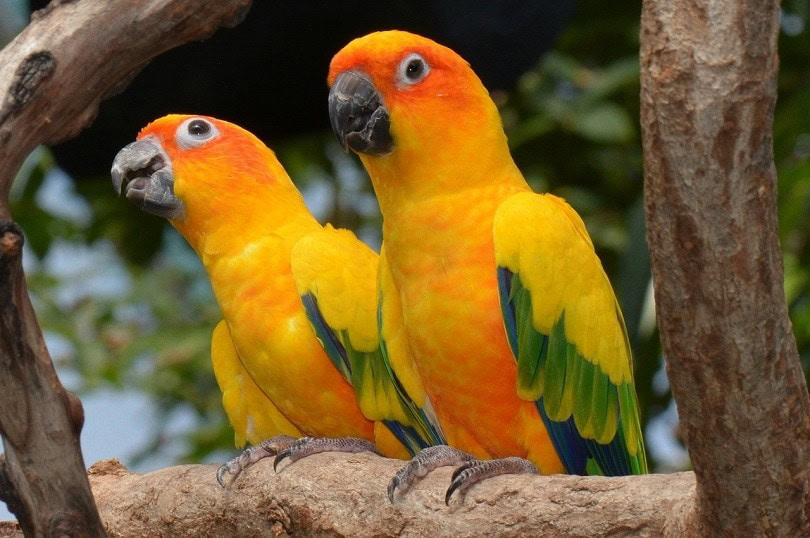Introduction to Sun Conures
Sun Conures (Aratinga solstitialis) are vibrant, playful, and affectionate parrots native to South America. Known for their striking colors and lively personalities, they make excellent pets for bird enthusiasts. This comprehensive guide covers everything you need to know about Sun Conures, including their features, care requirements, diet, and more.
Features of Sun Conures
1. Appearance
Sun Conures are famous for their bright plumage, which includes:
- Bright yellow and orange feathers on the head, chest, and underparts.
- Green wings and tail with blue flight feathers.
- White rings around the eyes and a black beak.
- Average size: 12 inches (30 cm) in length, weighing between 100-120 grams.
Their stunning colors develop fully by the age of 1-2 years, as juveniles have more green feathers that gradually change.
2. Personality & Temperament
Sun Conures are known for their:
- Playful and energetic nature – They love toys and interaction.
- Affectionate behavior – They bond strongly with their owners.
- Loud vocalizations – They can be noisy, making them unsuitable for apartments.
- Intelligence – They can learn tricks and mimic sounds.
3. Lifespan
With proper care, Sun Conures can live 25-30 years in captivity.
Sun Conure Care Guide
1. Housing Requirements
- Cage Size: Minimum 24x24x30 inches (for one bird).
- Bar Spacing: ½ to ¾ inches to prevent escapes.
- Perches: Natural wood perches of varying thickness.
- Toys: Provide chewable toys, ropes, and swings for mental stimulation.
- Location: Keep the cage in a social area but away from drafts and direct sunlight.
2. Diet & Nutrition
A balanced diet is crucial for a Sun Conure’s health:
Staple Foods:
- High-quality pellet mix (70% of diet).
- Fresh fruits: Apples, bananas, berries, mangoes (avoid avocado, which is toxic).
- Vegetables: Carrots, spinach, broccoli, peas.
- Nuts & Seeds: Limited amounts (high in fat).
Foods to Avoid:
- Chocolate
- Caffeine
- Alcohol
- Salty or sugary snacks
3. Grooming & Hygiene
- Bathing: Offer a shallow water dish or mist them 2-3 times a week.
- Nail Trimming: Required every few months (use a vet if unsure).
- Beak Care: Provide cuttlebone or mineral blocks for natural wear.
4. Exercise & Mental Stimulation
- Out-of-cage time: At least 2-3 hours daily for flying and play.
- Training: Teach simple tricks using positive reinforcement.
- Foraging toys: Encourage natural behaviors by hiding treats.
5. Common Health Issues
Sun Conures are prone to:
- Psittacine Beak and Feather Disease (PBFD)
- Vitamin A deficiency (due to poor diet)
- Respiratory infections (from drafts or poor hygiene)
- Feather plucking (due to stress or boredom)
Prevention: Regular vet check-ups, a clean environment, and a balanced diet.
Breeding Sun Conures
- Breeding Age: 2-3 years.
- Nesting Box: 12x12x12 inches with wood shavings.
- Clutch Size: 3-5 eggs, incubated for 23-27 days.
- Chick Care: Fledging occurs at 8-10 weeks.
Pros & Cons of Owning a Sun Conure
Pros:
✔ Highly social and affectionate
✔ Beautiful, colorful appearance
✔ Intelligent and trainable
Cons:
✖ Can be very loud (not ideal for apartments)
✖ Requires daily interaction (prone to loneliness)
✖ Long lifespan (requires long-term commitment)
Conclusion
Sun Conures are wonderful pets for those willing to invest time and effort into their care. Their dazzling colors, playful personalities, and strong bonds with owners make them a favorite among parrot lovers. By providing a proper diet, spacious housing, and plenty of interaction, you can ensure a happy, healthy life for your Sun Conure.
Final Tips for Sun Conure Owners:
✅ Spend quality time daily to prevent boredom.
✅ Offer a varied diet for optimal health.
✅ Keep their environment clean and stimulating.
Sun Conure For sale In Kerala | All Kerala Transportation
